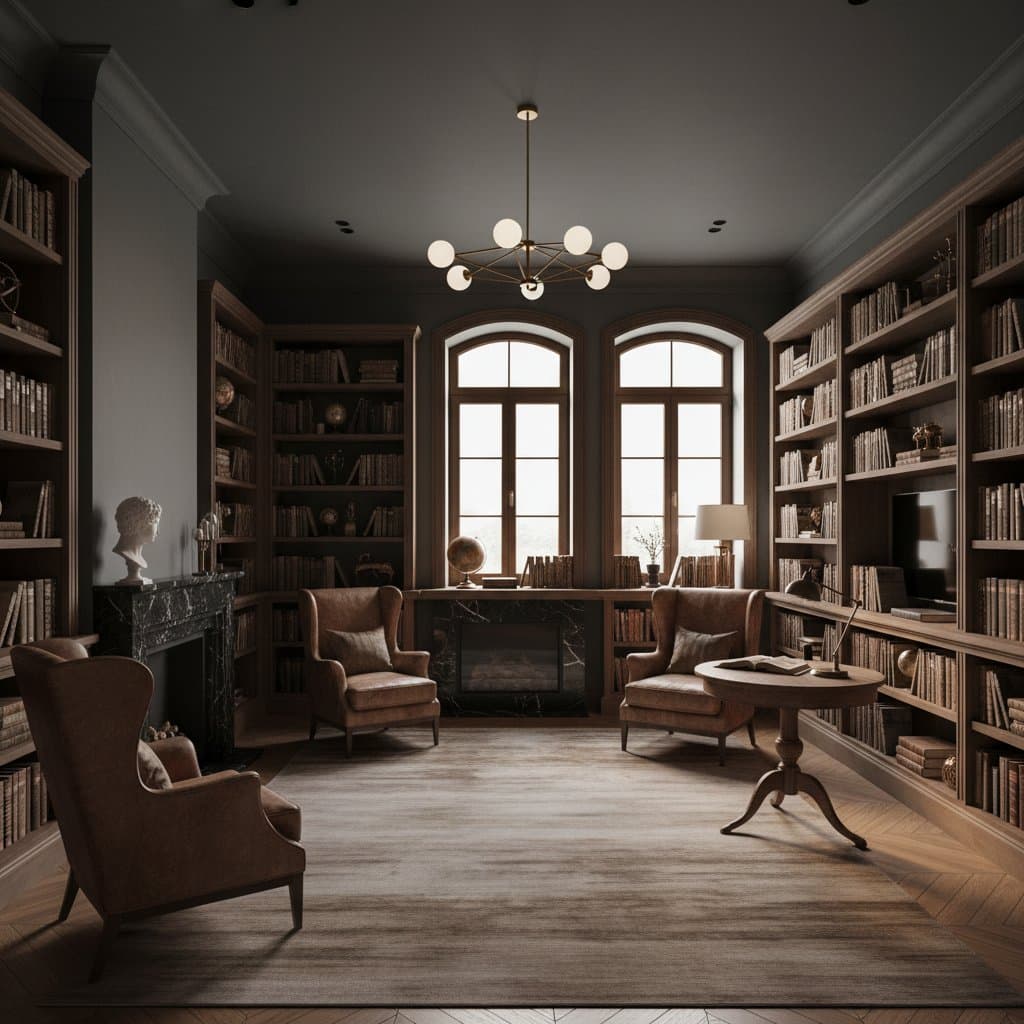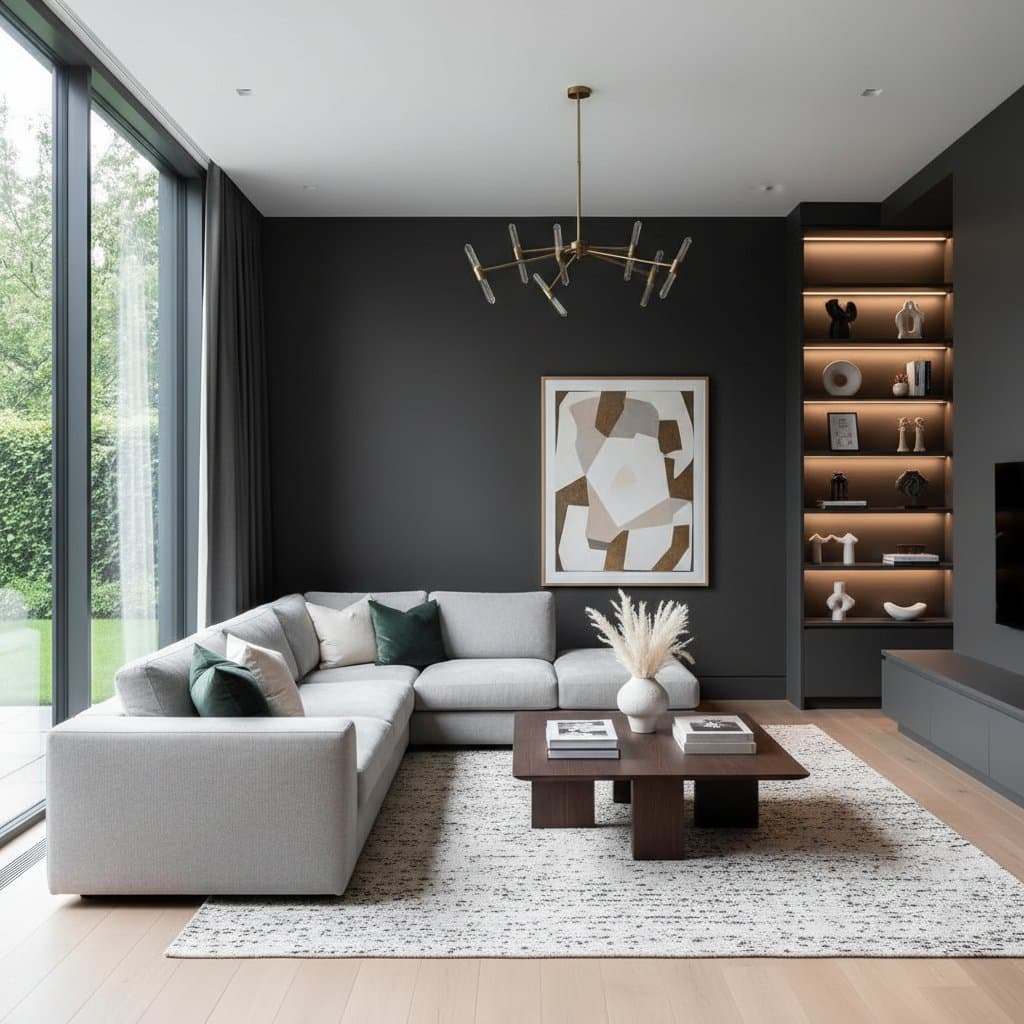The Impact of Moody Paints on Home Sales in 2025
Homes featuring dark, moody interior paints sell approximately 15% faster than comparable properties. These spaces often command a resale premium of 3 to 5 percent. Buyers gravitate toward rooms that exude depth, sophistication, and purpose.
Deep shades such as charcoal gray, navy blue, and forest green perform exceptionally in photographs. They mask minor surface imperfections and lend an air of professional curation to even modestly furnished areas. For sellers preparing to list their property, adopting a dark color palette represents a straightforward investment that yields tangible benefits in market speed and final sale price.
Real estate trends in 2025 underscore this shift. Listings with moody interiors receive higher engagement on online platforms. Prospective buyers perceive these homes as modern and thoughtfully designed, which accelerates decision-making and offers.
Detailed Cost Breakdown for Dark Paint Applications
Implementing dark paints involves several expense categories. Understanding these helps sellers budget accurately and maximize return on investment.
1. Paint Quality and Coverage
Premium formulations designed for dark hues provide superior coverage and longevity. These products typically range from $50 to $90 per gallon. One gallon covers about 350 square feet with two coats under ideal conditions.
Lower-cost options might require three or more coats to achieve opacity, which increases material use and application time. Select paints with high pigment density to minimize drips and ensure even color distribution on walls.
2. Surface Preparation Essentials
Preparation proves crucial for dark paints, as they highlight underlying flaws. Sanding glossy surfaces and patching uneven drywall add $1 to $2 per square foot when handled by professionals.
Applying primer prevents issues like uneven sheen or premature peeling. Professionals recommend a tinted primer matched to the final color for better results on large surfaces. Neglecting this step can lead to callbacks and additional costs post-painting.
3. Professional Labor Rates
Hiring experts for interior painting costs $3 to $6 per square foot. Rates vary based on ceiling height, wall texture, and intricate details like crown molding. Accent walls carry a minimum charge around $250 to account for setup and specialized attention.
In urban areas, labor may trend higher due to demand. Sellers benefit from quotes that include multiple rooms, as bundled services often reduce per-square-foot pricing.
4. Finish Types and Lighting Considerations
Matte or flat finishes in dark colors conceal imperfections effectively but attract fingerprints and scuffs. Satin sheens, which cost 10 to 20 percent more, offer improved durability and simpler cleaning.
Dark walls absorb light, so evaluate existing illumination. Adding recessed fixtures or lamps enhances perceived spaciousness. Budget an extra $100 to $300 for basic lighting upgrades if natural daylight remains limited.
5. Protection and Cleanup Expenses
Safeguarding furniture, floors, and adjacent surfaces adds about 10 percent to overall labor costs. Professionals incorporate drop cloths, tape, and plastic sheeting in their fees.
For DIY projects, allocate $20 to $50 for supplies like painter's tape and canvas covers. Proper protection prevents damage claims and ensures a smoother workflow.
Choosing Between DIY and Professional Painting
Decide on the approach based on project scope, skills, and timeline. Each option suits different scenarios in home preparation.
Ideal Scenarios for DIY Painting
- Tackle one or two small walls, such as an accent feature in a bedroom.
- Possess a steady hand, along with essential tools like brushes, rollers, and trays.
- Access all areas safely using a stable step ladder without overhead obstacles.
DIY saves money, typically 50 to 70 percent of professional fees. Practice on inconspicuous sections first to refine technique and color assessment.
When to Engage Professionals
- Address walls taller than 10 feet or complex architectures like vaulted ceilings.
- Include cabinets, ceilings, or trim work that demands precision and equipment.
- Deal with problematic surfaces showing cracks, stains, or signs of moisture.
- Face tight deadlines ahead of listing the property.
Experts complete jobs in days rather than weeks. They deliver uniform coverage free of streaks, which boosts buyer perceptions. The investment in quality workmanship often pays off through quicker sales and higher offers.
Long-Term Maintenance for Dark Paint Finishes
A well-applied dark paint job endures nearly a decade with routine upkeep. This longevity contributes to sustained home appeal.
Clean walls using a soft, damp cloth to remove dust and light marks. Steer clear of abrasive cleaners on matte or eggshell surfaces, as they dull the finish.
Store excess paint in airtight containers for touch-ups. Most high-end brands offer warranties spanning 5 to 10 years against fading or peeling. Retain receipts, batch numbers, and color formulas for warranty claims or matching future repairs.
In humid environments, monitor for blistering caused by trapped moisture. Address issues promptly by sanding affected spots and reapplying paint. Annual inspections prevent minor problems from escalating.
The Psychological and Visual Appeal of Dark Tones to Buyers
Dark paints evoke a sense of enveloping warmth and design expertise. They transform ordinary rooms into inviting sanctuaries that stand out in competitive markets.
In digital listings, moody walls provide striking contrast against neutral furnishings. Analytics from real estate platforms indicate that such photos garner up to 20 percent more views and inquiries. This visual edge translates to emotional connections, where buyers envision personalizing the space.
Psychologically, deep colors ground occupants and promote relaxation. Living rooms and bedrooms painted in these hues often receive praise for their cozy yet elegant vibe. Sellers report fewer price negotiations when interiors signal intentional styling.
Consider pairing dark walls with light accents, such as white trim or metallic hardware. This balance prevents spaces from feeling confined and appeals to diverse tastes.
Practical Steps to Implement Moody Paints
Approach the project methodically to ensure success and efficiency.
-
Select a primary room for initial application, prioritizing high-traffic areas like the living room or primary bedroom that influence first impressions.
-
Test samples by applying swatches to several wall sections at eye level. Observe colors under different lighting conditions throughout the day to confirm suitability.
-
Choose the appropriate finish: matte for a velvety, intimate atmosphere or satin for practicality in family homes.
-
Schedule professional assistance well in advance, especially during peak seasons when painters book rapidly.
-
Stage the room thoughtfully with sparse, light-colored furniture to emphasize wall depth without overwhelming the space.
-
Document the before-and-after transformations for listing photos, highlighting how the update enhances overall flow.
Realizing Value Through Strategic Color Choices
Moody paints deliver outsized impact relative to their cost. Unlike major renovations such as kitchen overhauls or flooring replacements, this update requires minimal disruption and budget.
Sellers who invest in dark interiors position their homes as premium offerings. The combination of faster sales cycles and elevated prices underscores the strategy's effectiveness. Focus on quality execution to unlock these advantages and attract discerning buyers in 2025.








